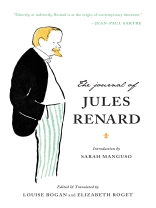Spanning 1887 to a month before his death in 1910, The Journal of Jules Renard is a unique autobiographical masterpiece that, though celebrated abroad and cited as a principle influence by writers as varying as Somerset Maugham and Donald Barthelme, remains more of a cult object in the United States.
Throughout his journal, Renard develops not only his artistic convictions but also his humanity as he reflects on the nineteenth-century French literary and art scene, and on th...
Über den Autor
Sarah Manguso is the author of seven books including 300 Arguments, a genre-defying work of nonfiction; Ongoingness, a meditation on motherhood and time; The Guardian...
Dieses Ebook kaufen – und ein weitere GRATIS erhalten!
Sprache Englisch ● Format EPUB ● Seiten 264 ● ISBN 9781941040829 ● Dateigröße 0.8 MB ● Verlag Tin House Books ● Land US ● Erscheinungsjahr 2017 ● herunterladbar 24 Monate ● Währung EUR ● ID 7471046 ● Kopierschutz Adobe DRM
erfordert DRM-fähige Lesetechnologie












